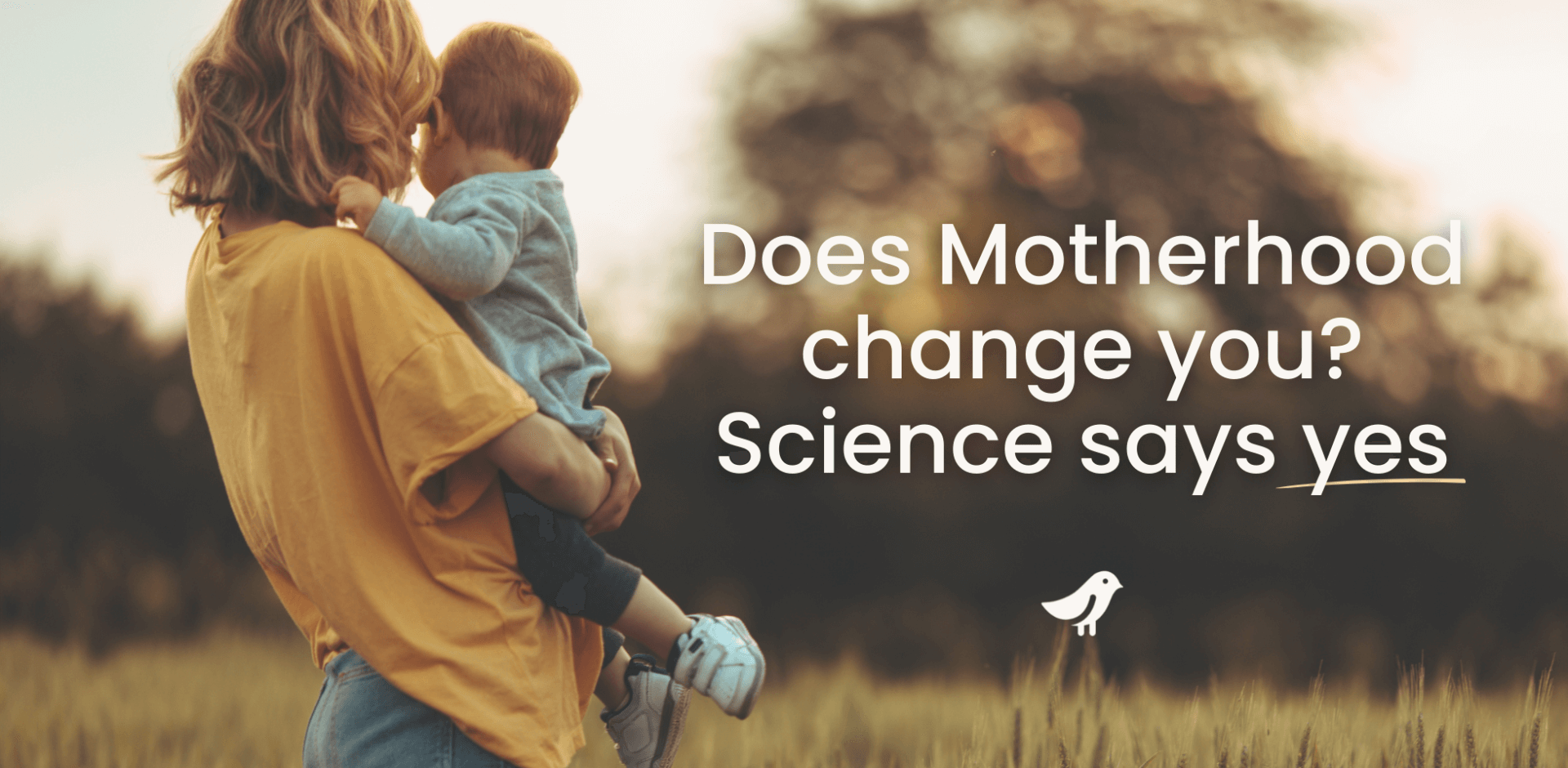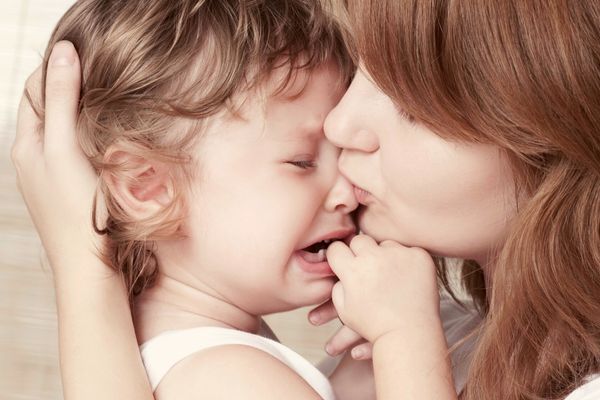As I sat down to write this article I had a nagging feeling my son’s nap would be over soon, even if he usually slept longer. So, I started a fresh Google Doc, typed a working title, and bam – crying.
There, I smiled at the almost absurdity of it. I lived in my own bubble for the first two and a half decades of my life. The world could crumble and I would barely notice, yet here I am, remarkably attuned to the tiniest of noises.

All of this reminded me of a scene in Zadie Smith’s Swing Time. The 23-year old protagonist and her boss (who’s a famous singer and a mum) are looking at Joshua Reynolds 1782 painting The Infant Academy. There, the mum finds the naked cherubs painting each other adorable, saying they remind her of her own boy. The younger woman thinks it’s ridiculous and “the pink-cheeked infants especially repulsive”. She observes: “What are babies[…], if they can do this to women? Do they have the power to reprogram their mothers? To make their mothers into the kinds of women their younger selves would not even recognize?”
Well, maybe.
I set my son up with his post-nap bottle (he’s old enough for this) and eagerly started researching the science of motherhood.
It’s mind blowing. Motherhood changes you. But it goes much deeper than we think. It’s not just about a heightened sense of smell, or (as some would say) a whimsical desire for a change in lifestyle or career. It’s a change to our very core, and there’s scientific evidence backing it up.
Maternal instinct – or is it?

According to psychotherapist Dana Dorfman, PhD, “when you become a parent, biologically or otherwise, your brain chemistry changes”. But rather than a maternal instinct in the traditional sense (that is, an instinct attributable only to the biological mother), it goes much further.
In fact, fathers and foster parents also experience heightened levels of oxytocin, serotonin, and dopamine during the transition to parenthood.
This ‘instinct’ also builds up gradually. Feelings of affection may start to develop several days after birth, and in some cases, even months. It also grows from an intense closeness and deep love and a strong connection that helps you understand your child and their needs.
So if you always just know, it’s because you do know. There’s your bond, as well as a concoction of chemicals involved.
Some parts of the brain grow…
A 2010 study found that as soon as the baby is born, there is “a small but significant increase in the volume of grey matter in brain areas responsible for emotion, reasoning and judgment, the senses and reward behaviour. However, as study co-author Pilyoung Kim notes, researchers still don’t know “whether it’s the experience that changes the brain, or the brain that changes the experience”.
While other parts of the brain shrink
 Blame it on mum-brain if you’re finding it harder to interact socially. A recent study published in the journal Nature Neuroscience found that motherhood brings with it a reduction in grey matter in regions involved in social cognition. And this lasts for up to two years after giving birth. Laura* agrees. Holding a conversation in the first months was hard – now that her son’s older, it’s harder for a different reason – kids crave attention when the adults are engaged in conversation.
Blame it on mum-brain if you’re finding it harder to interact socially. A recent study published in the journal Nature Neuroscience found that motherhood brings with it a reduction in grey matter in regions involved in social cognition. And this lasts for up to two years after giving birth. Laura* agrees. Holding a conversation in the first months was hard – now that her son’s older, it’s harder for a different reason – kids crave attention when the adults are engaged in conversation.
That said, we can only wonder what a pandemic plus motherhood did to the socialising areas of our brain!
Forgetfulness is real
Catherine Monk, Ph.D. is a professor of medical psychology at the New York-Presbyterian / Columbia University Irving Medical Centre. She speculates that ‘baby brain’ may be caused by ‘synaptic pruning’, a brain phenomenon that eliminates specific connections between brain cells to encourage new ones. So, instead of remembering someone’s name, your new-mom brain may reallocate resources to parts of the brain that allow you to figure out someone else’s wants and needs. That explains A LOT.
Natural highs
Some experts think that maternal behaviour is linked to a pleasure system in the brain. A 2008 study published in the journal Pediatrics found that when mothers see their babies smile, an area in the brain creates dopamine, a chemical messenger that causes a “feel good” high. This leads us to repeat whatever action created this feeling. Hence mission cooing-to-make-baby-smile (even if you swore you wouldn’t be that kind of mummy).
A surge in creativity

Artistic pursuits and children aren’t often positively correlated. Societal norms somehow dictate that the two cannot co-exist. At a local level, I vividly recall reading through disparaging Facebook comments when Ira Losco announced her first pregnancy. A cross section of the population took it upon itself to remind her that she couldn’t possibly juggle motherhood and her artistic career.
Speaking to Buzymummy just after her son Harry was born, Ira shared how her “biggest struggle was the fact that I did not want to stop making music once I became a mother”. She said that she was actually “more driven than ever to keep making music”.
Scientifically, it appears that motherhood doesn’t stand in the way of artistic pursuits. Studies actually suggest that women become more creative after having kids. As mothers, our brains require cognitive, emotional, and behavioural flexibility to help us adapt to our new environment. All of these are qualities that generate creativity.
Rex Jung, a neuropsychologist at the University of New Mexico says that at its core, creativity is original problem solving, an evolutionarily derived process that is important to survival. So when we’re in the thick of it; a newborn to take care of, and massive changes in our bodies, diets, and hormones, that is when “creativity emerges as a highly adaptive reasoning process”.
However, while creativity does soar, there are other challenges that creep up. These being both mentally and in terms of what society expects of us once our status changes from woman to mum. When women take a step back from creative pursuits, it’s not because they lost their creativity. It’s because they took a conscious decision to do so or our environment made that decision for them.
To sum it all up…
So, does motherhood change you? It looks like babies do have the power to reprogram their mothers, and as one of our Instagram followers perfectly put it: “sometimes for the better, other times not so much”.
Change is rarely easy, and when it gets too hard, do reach out for support. Just so you know, changes or not, you’re an amazing mum!
*Names have been changed to ensure anonymity



